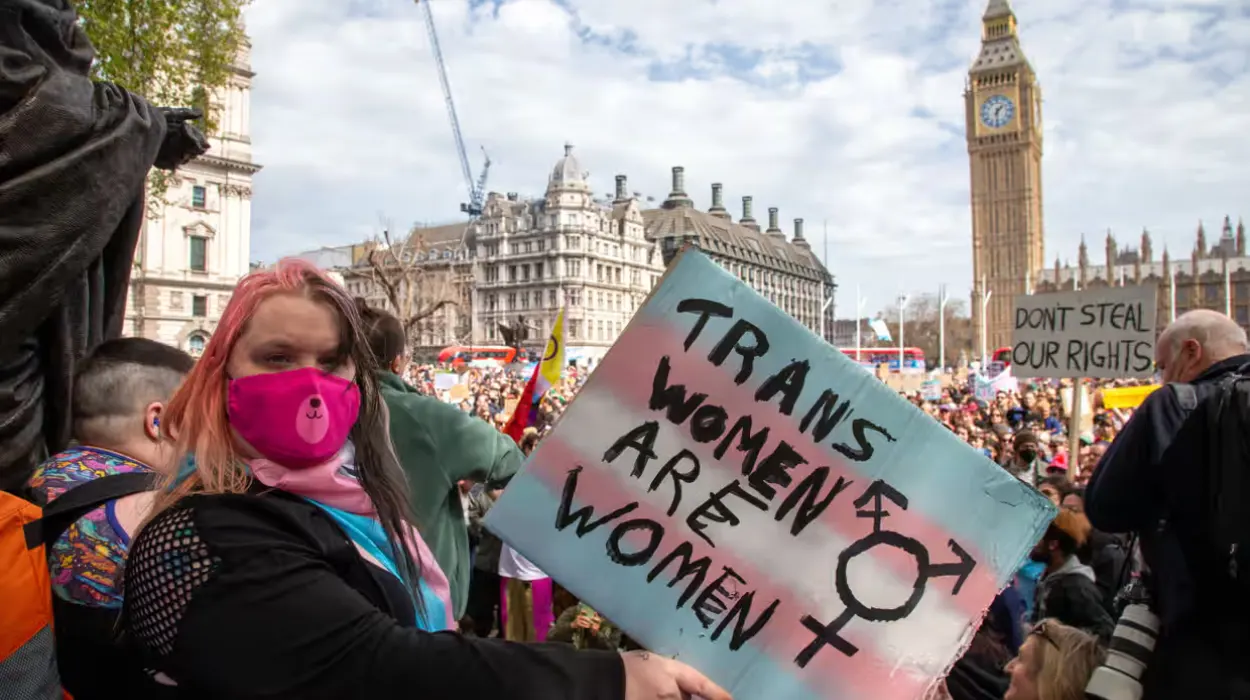UK (Parliament Politics Magazine) – Misinformation around the UK Supreme Court ruling on trans rights has sparked confusion, but trans women’s legal access to spaces remains unchanged.
As reported by The Independent, campaigners for trans rights have warned that widespread misinformation circulating within the community is causing fear and uncertainty, a month after the Supreme Court ruled on the legal status of women under the Equality Act.
Support groups have reported that “weaponised misinformation” regarding the ruling’s consequences has led to fear among trans individuals. Key concerns include whether trans women retain legal access to women’s toilets and other spaces.
Trans women have expressed anxiety about using women’s toilets in public, fearing arrest. However, the ruling did not introduce any criminal penalties.
What did Jane Fae say about trans people accessing women’s spaces?
Jane Fae, director of campaign group TransActual and chair of Trans Media Watch, stated,
“It’s fair to say trans people are afraid they’ll be arrested if they go in [women’s] spaces, because there are people who are afraid of that. It is creating panic.
She added,
“Any person saying now saying if you go in that space you’ll be arrested, is talking nonsense. There is no crime. But [trans people] are self-limiting because they are scared.”
What did Lui Asquith say about trans people accessing women-only spaces?
Lui Asquith, a lawyer at Russell-Cooke who represented Amnesty International UK, clarified that the Supreme Court did not determine it is illegal for a trans individual to use a women-only space.
They said,
“The fact that this question is even being asked reflects the way this judgment is being communicated to the general public,”
adding,
“The judgment deals with the rules around possible discrimination by service providers; particularly, when they can rely on the exception which permits discrimination by service providers based on the ‘sex’ protected characteristic in certain, limited circumstances.”
They stated,
“The Equality Act is mainly enforced in employment tribunals and the civil (not the criminal) courts – the Equality Act does not involve criminal law, which the state enforces by prosecution in the criminal courts.”
They continued,
“The confusion may lie in the fact that there are forms of harassment that are dealt with as criminal offences, but that isn’t what this judgment was dealing with.”
What did Steph Richards say about the impact of misinformation on the trans community?
According to Steph Richards, CEO of TransLucent, confusion and false claims regarding the court decision have caused “fright” and “emotional distress” among many trans people.
He added,
“There are people who have just been going to their work, lots of people don’t even look at the news these days because frankly its quite miserable. So I think there’s been a degree of shock, and because it has been so misinformed that this is a criminal issue when it’s not – it’s a civil issue – there have been concerns.”
What did Jo Maugham say about the impact of the EHRC statement on gender non-conforming women?
Jo Maugham, head of the Good Law Project, said more trans and gender non-conforming women are facing confrontations, reflecting growing hostility toward those who don’t conform to gender norms.
He added,
“Anecdotally, we can see a rise in violence against gender non-conforming women, be they cis or trans. I would describe the EHRC statement as misinformation, which has had a very profound negative effect on the lives of, in particular, gender non-conforming women.”
What did the EHRC guidelines say about trans women using women’s facilities?
The Equality and Human Rights Commission issued guidance advising against trans women using women’s facilities in workplaces and public-facing settings, including stores and hospitals.
The equalities watchdog has faced threats of legal action, with TransLucent’s lawyers warning that it “incorrectly describes the court’s legal stance.”
What did the EHRC spokesperson say about their response to the Supreme Court judgment?
A spokesperson for the EHRC stated,
“At the EHRC we uphold and enforce the Equality Act. Our response to the Supreme Court’s judgment has been, and will continue to be, firmly grounded in the law. Those who rely on us are reassured that every explanation of equality law from the EHRC will be accurate and authoritative. That is our job, as Britain’s independent and expert equality regulator.”
They added, “We know there is uncertainty among duty-bearers and affected groups. The EHRC has been visible in providing clarity on the consequences of the judgment and will continue to be so. We will shortly launch a consultation on the detailed draft updates made to our statutory Code of Practice for service providers, public bodies and associations, following the Supreme Court judgment. It is important that our code is both an accurate interpretation of the law and clear to those who use it.
The watchdog spokesperson continued,
“We want to hear affected stakeholders’ views on the clarity of these updates. So we urge interested parties to respond to the consultation when it is launched. We will consider every response carefully and amend the draft where necessary following the consultation. The EHRC is wholeheartedly committed to upholding everyone’s rights and tackling discrimination in all its forms.”
What did the Supreme Court rule about the definition of ‘woman’ under the Equality Act?
The Supreme Court has ruled in a landmark judgment that trans women are not legally recognized as women under the Equality Act.
On 16 April, in an 88-page ruling, Lord Hodge, along with Lords Reed, Lloyd-Jones, and Ladies Rose and Simler, explained that although the Equality Act does not mention “biological,”
“the ordinary meaning of those plain and unambiguous words corresponds with the biological characteristics that make an individual a man or a woman.”


